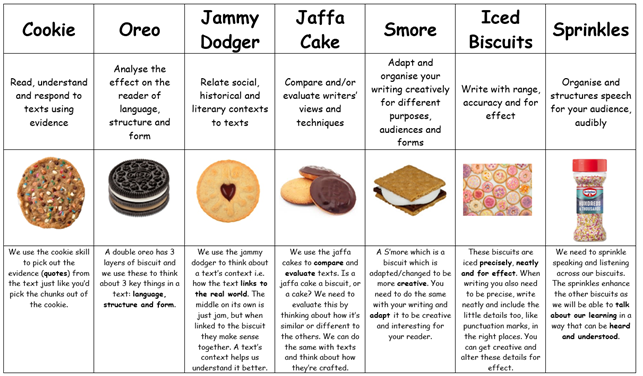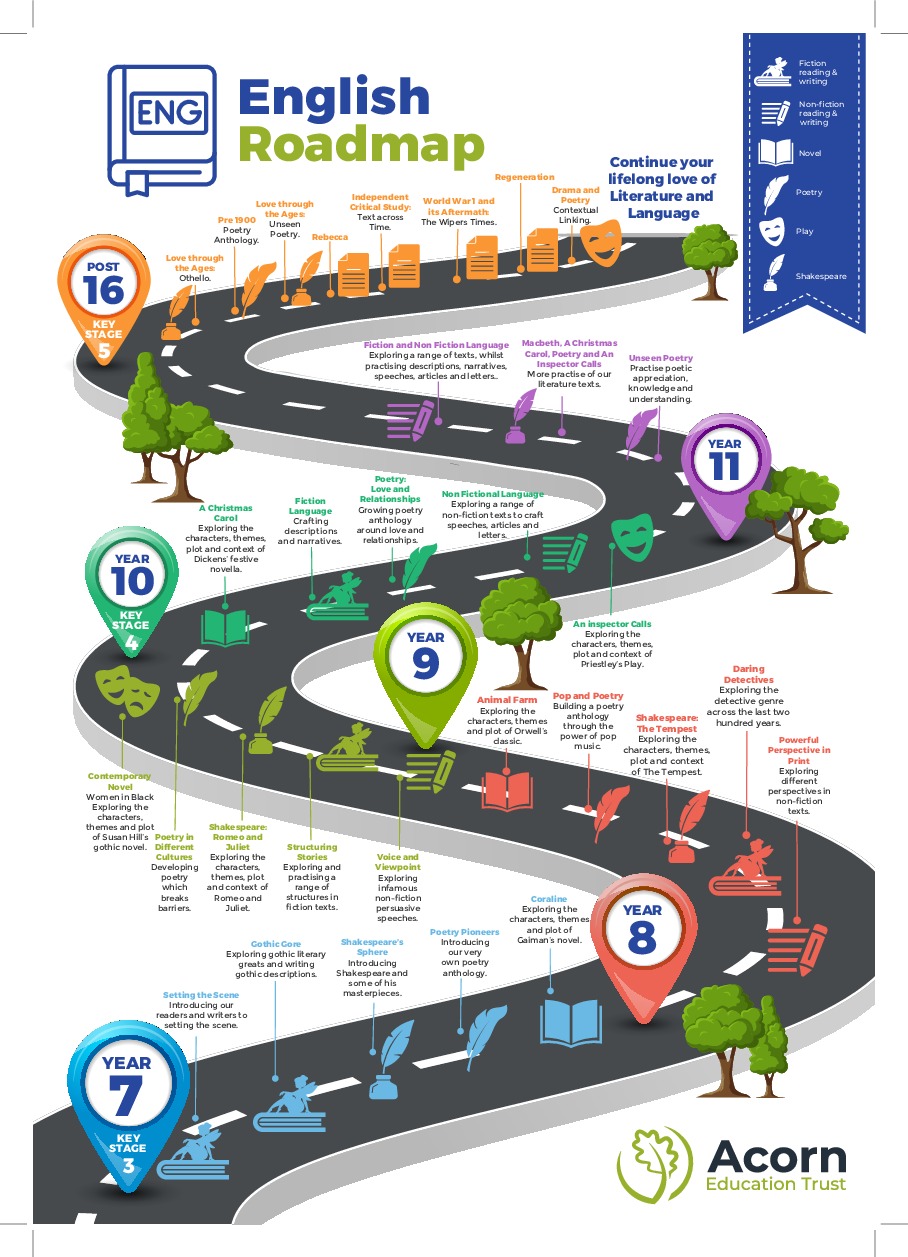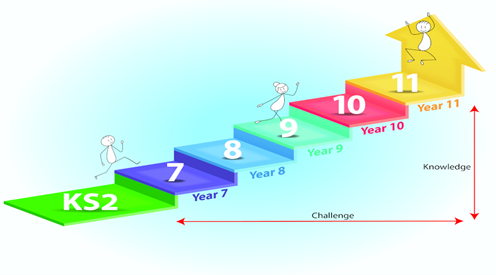English
Moving from Primary to Secondary
From KS2 we look to develop our readers, writers and speakers through synoptic exploration of texts: novels, plays, poems and non fiction. We also continue to practice spelling, punctuation and grammar regularly and cumulatively in lessons.
Creating Subject Experts
We want our learners to become great readers, great writers and great speakers.
Our learners practice and improve their disciplinary skills for reading, writing and speaking, to prepare them for their world in their time. Inspiring creativity and enthusiasm for our subject, we have selected an ambitious range of fiction and non fiction texts. We select texts to share which will spark our readers imagination and widen their worlds, while also encouraging our writers and speakers to develop their own voice. We expose our readers to a diverse, deepening anthology of texts; delivering a richly connected curriculum, it is carefully sequenced to allow for the practice of our key disciplinary skills across a wide range of texts which are rich, varied and challenge our learners.
We carefully sequence and interleave our seven key disciplines across KS3 and a range of reading and writing assessments across each year to help us support our learners progress in their reading, writing and speaking.
Reading is central to our curriculum. We want our readers to be great! It is also key to developing resilience, independence and success across the entire curriculum. If a learners is struggling to learn to read, we will provide targeted intervention to fill the gaps and help them on their reading journey.
We support our English curriculum through focussed, targeted communications lessons across year 7 and year 8. These focussed lessons are used to develop our writers’ and readers’ use of punctuation, paragraphs and vocabulary.
Subject Disciplines (Skills)

Subject Substantives (Knowledge)
While interleaving our biscuit disciplines into our curriculum, we practice these skills using our subject substantives. These golden threads allow our readers, writers and speakers to improve using progressively challenging practice of the biscuit disciplines.
Across key stage three, our learners will build an anthology of texts they have read and practice a range of forms of writing. These subject substantives include:
- Fiction reading and writing
- Non fiction reading and writing
- Shakespeare
- Poetry
- Novels and Play
Roadmap

Deepening Information
Our biscuit disciplines are taught cumulatively across key stage three and interleaved constantly across the substantive subject threads. This allows our readers, writers and speakers to deepen their knowledge, understanding and expertise. For example, they will begin key stage three understanding a range of Shakespeare’s plays: characters, themes and some context. They will select textual evidence from his plays using the cookie skill. Our learners will then deepen their skills through immersing themselves in entire plays: The Tempest in year 8 and Romeo and Juliet in year 9. Here they will build on their cookie skill to develop what, how, why analytical explorations incorporating Shakespearean context into their responses.
How we assess your child
Assessment Grades KS3
Students complete assessments in each of their subjects at key points during the year which test their understanding of all the knowledge they have learnt to date (we call these cumulative assessments). We grade these assessments on a scale from 1-9 (9 being the highest). The assessments are designed so that each year they become more challenging and test students on their growing bank of knowledge.
Therefore, as an example, if your child achieves a grade 5 in an assessment in Year 7, we can predict confidently that they should go on and achieve at least a grade 5 at GCSE. This is providing they keep working hard and progressing. Please note: this prediction states “at least”. Students often achieve higher than this.
In years 7 – 9, in practical subjects (PE, Drama, Music etc.), we assess students on their practical ability and skills. This gives us a strong indication of how successful they would be if they chose one of these subjects as a GCSE option. However, in order to get a fuller view of their potential success, it is also important to consider their grades in the core subjects. This is because there is often a literacy, numeracy, or scientific element to the courses.

Assessment Grades in KS4
Students complete mock exams in each of their subjects at key points during the year which test their understanding of all the knowledge they have learnt to date. We grade these mock exams on a scale from 1-9 (9 being the highest). In the report you will see:-
-
Target Grade: This is based on a student’s past performance. It is an aspirational but achievable target
-
Mock Grade: The grade they achieved in the mock exam
- Predicted Grade: The grade a teacher believes a student will achieve in the final exam, if they maintain their current ATL and performance
Assessment Grades in KS5
Students complete mock exams in each of their subjects at key points during the year which test their understanding of all the knowledge they have learnt to date. We grade these mock exams on a scale from A*-E/Distinction* - Pass. In the report you will see:-
-
Target Grade: This is based on a student’s past performance. It is an aspirational but achievable target
-
Mock Grade: The grade they achieved in the mock exam
-
Predicted Grade: The grade a teacher believes a student will achieve in the final exam, if they maintain their current ATL and performance
Exam Board Information
|
English Language GCSE
English Literature GCSE
|
||||||||||||||||||||||||||||||



